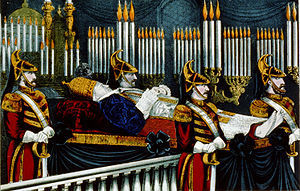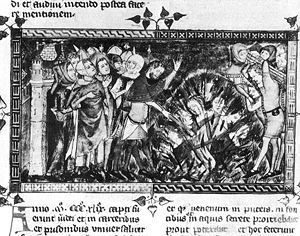Stuart Aken's Blog, page 275
December 9, 2011
Stuarts' Daily Word Spot: Gadget
 Gadget: noun - an accessory, knick-knack, or adjunct.
Gadget: noun - an accessory, knick-knack, or adjunct.'It's frequently said thatmen are far fonder of gadgets than are women, in fact, it's often said they'refonder of gadgets than they are of women. Not, I'm pleased to report, astatement that's true of me.'
'Bryan has a gadget foralmost everything. He says he even has one for digging himself out of troublewith his wife, though he's never shared it with me, the sod.'
Pic: Zemanta failed to come up with a suitable picture for this topic, so here's a shot of surf on Chessil Beach, for which I have no better excuse than that I love the sea and took this on a recent holiday.

Published on December 09, 2011 11:30
December 8, 2011
The Worthlessness and Power of Celebrity.
 Image via Wikipedia
Image via WikipediaThe recent enquiryregarding phone hacking by journalists led me to lend some thought tocelebrity, which is more than most celebrities do for themselves, of course.It's an odd state, whenyou consider it in a rational light. People, often with no discernible talentand with little to offer the world in general, attract publicity, which, inturn affords them an income in various ways. So, we have individuals, incapableof stringing together a reasonable sentence, putting their names to novels andautobiographies patently written by ghost writers. We have others, without ashred of scientific knowledge, claiming to have designed perfumes, which haveclearly been concocted by those in the professional know. Yet others act aspresenters of TV programmes, where their inanity and stupidity irritates anyonewith even the most basic sensibility.And the most peculiaraspect of this feeding on fame from no good cause, is that there are sufficientmembers of the public gullible enough to support these nonentities. I have toconfess to being baffled by this. The world is teeming with people who havereal talent, folk who produce work of real merit, individuals who give theworld something worthwhile. Surely, if people have a need to worship, follow orbecome fans, they can direct their adoration toward those who deserve it? Or,is it that those who have no talent recognise the celebrities without talent,and hope and dream that they might one day emulate their material success?Does it all matter?Well, yes; I think itdoes. It's an unarguable fact that money promotes power in its possessors. So,giving money to fools, ne'er-do-wells, self-publicists and those liars whoclaim to be authors of various works of talent, provides them with power farbeyond either their capacity or their desserts. This power resides in areassuch as purchasing power, slewing the markets in ways that would otherwise notexist. It's reflected in influence, which these individuals deserve no more thanthe common man. Most importantly, it shows in their access to the media, wherethey're able to spout their ill-considered or spurious opinions and claims toyet more of the gullible.When there exist largenumbers of talented individuals who remain ignored and under-appreciated, it seemsto me a shame that these celebrities gain undeserved fame, riches and followerswithout positive effort. I would far rather see the media promoting people whohave some worth in society, and the public showing appreciation to those whodeserve it for their contribution to the world.I feel this is somethingthat needs to be said and I don't care that some will see my reasoned statementas a contention based on envy. It isn't. But, I will, inevitably, be accused ofsour grapes. So be it.
A question for you toponder: How important do you have to be before you're assassinated, rather thansimply murdered?

Published on December 08, 2011 14:00
Stuart's Daily Word Spot: Eager/indifferent?
 Image via Wikipedia
Image via WikipediaEager/indifferent: antonyms
Eager: adjective - full of or demonstratingkeen desire or appetite; impatiently longing.
Indifferent: adjective- without inclination or feeling for or against someone or something; unconcerned,unmoved, uninterested.
'James was indifferent to Jenniferwhen she wore her spectacles but, when she removed them he was eager for herattention, thereby demonstrating the superficial nature of most young men.'
'Jennifer was so eager forattention that she ditched common sense, modesty and self-esteem, along withmost of her cover in order to attract James. But, when he finally showed aninterest in her and stroked a clammy hand over her skin, she grew indifferentand, making an inaudible excuse, hurried out of his sight.'
8th December 1792 - Henry Laurens became the first person to be legally crematedin the USA. 8th December 1854 - Pope Pius IXproclaimed the Immaculate Conception, making Mary free of Original Sin. Agenerous and timely gesture on behalf of this male dominated club, whichfollowed years of disapprobation of the innocent mother of their spiritualleader with a new determination to make her into a virginal saint. Always theextremes: this poor woman who, if there is any historical element to the myths,was clearly no more than the lover of the man she expected to marry but wassubject to painful death under the religious law of the land at the time.Wouldn't you conceive a cover story under such circumstances?

Published on December 08, 2011 11:30
December 7, 2011
Stuart's Daily Word Spot: Face
 Image via Wikipedia
Image via WikipediaFace: noun - front of head, from forehead to chin; visage, countenance; correspondingpart of an animal, insect, or other creature; a portrait; form of address to someone,especially if admired or despised. Slang; the countenance as a way ofexpressing feelings, character; what's shown by expression; a grimace; thecountenance with regard to beauty, make-up, cosmetics; the surface of anything;in Astrology - a third of a sign of the zodiac, extending over 10 degrees inlongitude; a polished surface; either side of a medal or coin; the outer orupper side of a two-sided object; the front; the inscribed side of a document; thepicture side of a playing card; in Architecture - the facade of a building; theexposed surface of a wall; the front of an arch; the main side, frequentlyvertical or steeply sloped, presented by the front of a cliff, a geologicalfault; an open slope or hillside; each surface of a solid; the dial of a clockor watch; the working surface of an implement or tool; the striking surface ofa cricket bat, golf club, hockey stick, etc.; external look; semblance of; outwardshow; disguise, pretence; a pretext; visible state or condition; aspect; in Typography- the printing surface of type; a style of type; boldface, fat-face, old-face,etc.; in Mining - the end of a tunnel where work is going on; the principalsurface from which coal is being removed.
'Karmen Kass is the faceof Max Factor today.'
'George made a face whenhis mother tried to get him to eat sprouts.'
'Climbing the face of thecliff required more skill than Jennifer had developed at this stage and shefell off, plunging into the calm sea below.'
'The medallion awarded tothe winning competitors had one face bearing the name and date of the contestbut the main face carrying a depiction of a naked female athlete engaged in thesport.'
7th December 1732 - The Royal Opera Houseopened in Covent Garden, London.7th December 1783 - Theatre Royal opened inCovent Garden, London
7th December 1783 - WilliamPitt Jr (24) became Britain's youngest Prime Minister7th December 2011- It's 70years since Pearl harbour was attacked by the Japanese

Published on December 07, 2011 11:00
December 6, 2011
Stuart's Daily Word Spot: Early or low teens?
 Image via Wikipedia
Image via WikipediaEarly or low teens?
Time and again, you hearor read an item featuring numbers, often written by professional writers, wherethe presentation of numbers is illogical. Does it matter? Well, it does to me.If language is to retain any meaning, we surely need to use it in a way whichmakes sense, don't we? Unless, of course, you subscribe to the view that all artis subjective and the artist must be allowed the freedom to convey whatevermood, attitude or impression he or she intended. Even in this, however,inaccurate language will cause a failure for such ambition, since the veryinaccuracy will necessarily distort the responses of readers.
e.g. 'An articulation ofelephant orifices undergoes an extraordinary undulation in determining theacuity of the random prognostications of potential irradiation therapies.' This sentence employs thecorrect structural method and is grammatically sound. But it means absolutelynothing, because the words used aren't the right ones to convey meaning.
Okay, so what's all thisgot to do with the heading? Let me illustrate:
A weather report issuesyou with daily temperatures and states that these will be in the early teens.A news report details theantics of a politician and his claims for expenses, telling you that these werein the late thousands.A historian tells you thathe has discovered bones that date back to the low centuries of the iron age.A financier reports thatthe interest on an attractive bond issue will mature in the high twenties ofthe century.
All the foregoing aresamples of items I've either heard or read. I'm sure you must've come acrossthis sort of careless use of numbers on many occasions. The rules are simpleenough to employ if you want to avoid joining the ranks of the ignorant orcareless.
If the item has to do withdegree or intensity; e.g. the heat in temperature, the amount spent in money,etc., then you need to refer to the 'high' or 'low' teens, twenties, hundreds,or whatever.
If the item relates to thepassing of time; e.g. the age of something or someone, the number of seconds,minutes, hours, days, years taken, etc., then you need to use 'early' or 'late'teens, forties, thousands, or whatever.
So, does it matter thatthese writers/presenters mix up context in this way? Well, it indicates thatthey're unaware of the real meanings of the terms they're using, and doesn'tthat make you wonder if they know anything about what they're telling you?Confidence in written/spoken material is surely something we should all aimfor, if what we have to report is going to carry the necessary weight forcredibility.
6th December 1768 - 1st edition of"Encyclopedia Britannica" published in Scotland.

Published on December 06, 2011 11:30
December 5, 2011
Stuart's Daily Word Spot: Discombobulate
 Image via Wikipedia
Image via WikipediaDiscombobulate: verb- North American slang: upset, disturb, or disconcert.
'Frances was frequentlydiscombobulated by the manic antics of Francis, causing her to fret and panic.'
5th December 771 - Charlemagne became thesole King of the Franks following the death of his brother, Carloman.5th December 1349 - 500 Jews of Nuremberg weremassacred during the Black Death riots
5th December 1360 - TheFrench Franc was created, only for it to be replaced by the Euro in 1999.

Published on December 05, 2011 11:30
December 4, 2011
Free Book for Xmas, Help Yourself, and Smile.
 It's about time I rewarded my readers with a small gift, so I've published a short story in ebook form for all of you. But, Baby, It's Cold Outside is available through Smashwords for all ebook formats and platforms. All you need to do is click here.
It's about time I rewarded my readers with a small gift, so I've published a short story in ebook form for all of you. But, Baby, It's Cold Outside is available through Smashwords for all ebook formats and platforms. All you need to do is click here.For those of you who don't have an ereader, no problem. You can download a couple from here, just by clicking on the links:
For the Kindle on your PC, click here for UK and here for USA & rest of the world.
For the Adobe ereader, click here.
But, Baby It's Cold Outside is intended for an adult readership and I wouldn't recommend it for anyone under 15 years of age, though there is nothing either crude or violent in this story of an interrupted NewYear's Eve between lovers.
But, Baby It's Cold OutsideI'm seeing in the New Year, with my chosen lover, in front of the fire.Wonderful. Until, that is, an unidentified rural noise makes the townie nervousand something must be done to restore the magic.
Enjoy. And an early Happy New year to all. By all means, spread the word to your friends and family. I'd like to give the gift to as many people as possible. Spread the joy, I say.

Published on December 04, 2011 16:33
Stuart's Daily Word Spot: Daft/sensible
 Image via Wikipedia
Image via WikipediaDaft/sensible: antonyms
Daft: adjective - meek, mild, humble, silly; lacking intelligence;stupid; reckless or wild; of unsound mind; crazy; madly playful; giddy.
Sensible: adjective - having, displaying, or derivingfrom good sense or practical wisdom; reasonable, judicious; of clothing andfootwear: practical instead of attractive or fashionable; functional,serviceable.
'Danny was daft as abrush; he wore ballet pumps to do the gardening and wellington boots in bed.'
'Selina was daft aboutMichael and would wear anything he demanded of her; even her skin, inpublic.'
'Jeremy, on the otherhand, was always to be seen in sensible attire; his sports jacket and brogueslabelling him as less than adventurous in the fashion arena.'
'Oh, do be sensible,Patricia: you can't possibly climb the mountain carrying a sack of coal on yourback.'
4th December 1619 - America's firstThanksgiving Day took place.4th December 1791 - The Observer, the oldestSunday newspaper in world, was first published in Britain.

Published on December 04, 2011 11:30
December 3, 2011
Stuart's Daily Word Spot: Cacoch
 Image via Wikipedia
Image via WikipediaCacoch: Another of myoccasional gods of the world, ancient and modern.This one, from the Mayanstable, is a creator god, who apparently brought forth the water lily, which,in turn, was the life form from which all other Mayan deities sprang. It seemsa little odd that, as the initiator of the other deities, he is also placed inthe rather lowly role of the messenger of another creator god, Hachacyum. But I guess this inconsistency is simply inline with most religious myth and legend, in that there is little of logic ofreason involved.
3rd December 1621 - Galileo invented thetelescope; good man. A great help in dispelling many of the then current mythsabout the Earth and its place in the universe.3rd December 1678 - Edmund Halley, theastronomer, received an MA from Queen's College, Oxford.

Published on December 03, 2011 11:30
December 2, 2011
Stuart's Daily Word Spot: Fable/truth
 Fable/truth – antonyms.
Fable/truth – antonyms.Fable: noun - a fictional narrative orstatement; a myth or legend; a fiction devised to deceive; a ridiculous or dishoneststory; idle talk; something falsely claimed to exist, or not existing outside legend;a short story with animals as characters conveying a moral; someone or somethingthat has become proverbial.
Truth: noun - faithfulness, loyalty, constancy;trust, confidence; belief, a creed; disposition to speak or act truly orsincerely; truthfulness, sincerity; fact, facts; the matter or circumstance asit really exists; the real thing, as opposed to a representation or imitation; aReligious belief or doctrine held to be true or orthodox; orthodoxy; conduct inaccord with a divine standard; spirituality of life and behaviour; what is trueor real; reality; a true statement; something held or accepted as true; a fixedor established principle; conformity with fact; genuineness; authenticity; accuracyof representation in art or literature; lifelike quality; in Architecture, withoutpretence or imitation; conformity with a standard, pattern, or rule; accuracy,precision, correctness.
'Most of the stories and reportsconcerning religious entities are fables; that these myths and legends havelong been mistaken for truths is a matter for great concern amongst those whounderstand the value of honesty.'
'The behaviour and valuesof the vast majority of politicians, in particular the leaders in that field,demonstrate that they have no understanding of the meaning of truth. Like somany journalists, they mistake opinion for fact and proceed as though theirparticular beliefs about social matters equal truths, when, in most cases they representonly their own narrow and often distorted views of reality.'
2/12/1697 - St Paul's Cathedral was opened in London
2/12/1755 - The second Eddystone Lighthouse was destroyed by fire.
Pic: Barmouth beach, Dorset.

Published on December 02, 2011 12:00



